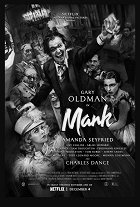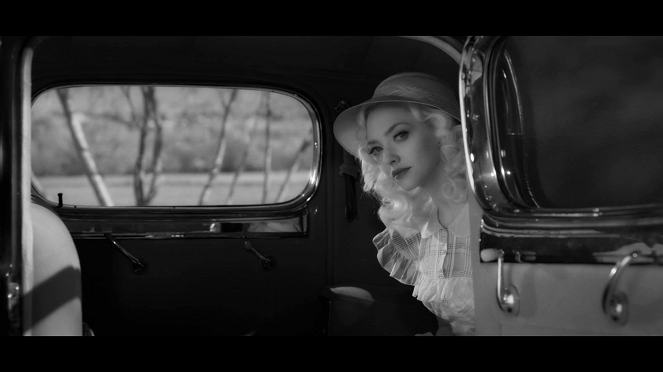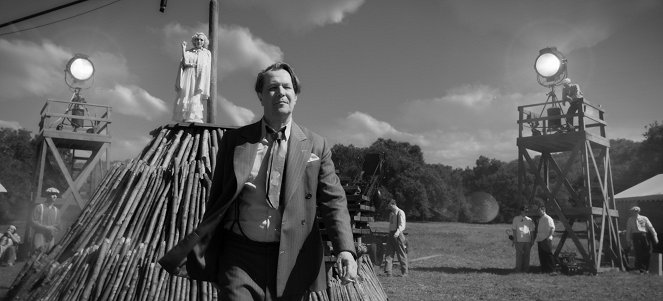Directed by:
David FincherScreenplay:
Jack FincherCinematography:
Erik MesserschmidtCast:
Gary Oldman, Amanda Seyfried, Lily Collins, Charles Dance, Tom Burke, Joseph Cross, Tuppence Middleton, Leven Rambin, Tom Pelphrey, Arliss Howard (more)VOD (1)
Plots(1)
1930s Hollywood is reevaluated through the eyes of scathing wit and alcoholic screenwriter Herman J. Mankiewicz as he races to finish Citizen Kane. (Netflix)
Videos (2)
Reviews (14)
Mank certainly doesn't hide its Oscar ambitions and at the same time represents one among a number of films where (academic) form rolls over (audience-friendly) content. The black-and-white visuals, the fading blackouts, the vintage opening credits and the premise of the film take the viewer back to the golden era of Hollywood, a time of big studios, bright stars and screenwriting teams and solitaires. David Fincher's Mank is a skillfully made biopic, but for most of its running time it lacks any dramatic or deeper scene – it wasn't until near the end, when Mank's pours out of his heart while watching Citizen Kane, that I felt stronger emotions. A promising film in terms of acting and themes, but one that limps along on a lackluster execution.
()
In the first minutes, if not seconds, I was amazed by how Mank looks - truly like it was filmed 80 years ago, a beautifully restored film that made it to Netflix this year (and, sadly, not to movie theatres where it REALLY deserves to be). The best part is that the amazement didn't leave me by the end of the film, and it is also great in terms of the script, the actors (Gary Oldman is even better than you think), actresses (the magical Amanda Seyfried and Lily Collins) and music (untypical but excellent Reznor and Ross). If you don't want to watch Citizen Kane before Mank, then after Mank you will. And then you'll probably watch Mank again.
()
It’s very inconsistent, I was a bit disappointed immediately after the screening, then I was writing a more extensive review, during which the film matured in me and, probably too naively, I started looking for cinephile themes and similarities or variations of Citizen Kane, only for Mank to vanish from my mind suspiciously fast a day later. I don’t mind the mythologisation of Orson Wells’s sparse participation in the screenwriting process of Citizen Kane, because I don’t take historical accuracy very much into account when evaluating a film, but it still affected my original idea regarding the coherence of the narration – though I think Fincher develops well the titular character, who in many aspects is a contrast of Charles Foster Kane (which is actually highlighted several times by the style and staging of some scenes), and provides a focused image of the time, but the individual segments feel a little haphazardly put together and don’t move the story forward much. The secondary characters are very numerous and at times it’s not clear what the author wants to say with this or that memory. Also, unlike his other films, Fincher doesn’t deliver any surprises, nor does he pull the viewer into a whirl of psychological motifs. Mank is a nostalgic retro painting that should hang at an art gallery attended only by very specific fans of period films, but it’s hanging between other new releases on Netflix, the brush strokes are clearly contemporaneous and evoke the style of the time only because they are in black and white. I respect Mank as something that brings diversity and a magical recreation of its time that irradiates love for filmmaking, and I must also admit that it didn’t bore me even for a second. I will gladly go back to it, but next time without expecting to find SOMETHING at any cost in this anticipated tribute to a great film and a difficult era (and I really tried and lied myself that that SOMETHING is there), and maybe I will be able to appreciate it from a different perspective. For the time being, though, I have to say that a couple of days ago I wouldn’t have believed that David Fincher could feel so impersonal (though still strong and beautiful to look at).
()
"WhY dOEsN’t FiNCher MaKe aNoTHeR Se7en?!?§" the movie. A work hardly applicable in a non-American environment (god, just the idea that it has Czech dubbing or subtitles in the usual Netflix quality), for which one can't be mad at Jarmila Střížkova here for absolutely not knowing where its head is at. In our confines, then, it's mainly a problem that among the mainstream cashless-market critics, there is no one who has the will to interpret and articulate the film to the local viewer, used to boredly clicking through the endless Netflix offerings in his sweatpants on the couch to see if there is anything else capable of engaging him. We all laughed at the Spáčilová until we discovered that there never was a Spáčilová, it was always just us. The absence of Mank from theaters is one of the most unfortunate things to happen this year.
()
Mank attracts viewers primarily through its unraveling of the tangle of influences that led the title character, an alcoholic screenwriter, to write the celebrated Citizen Kane. However, the actual writing of that screenplay plays second or rather third fiddle in Mank, as there is no depiction of the classic’s shooting, the great Tom Burke as Orson Welles appears on screen for a total of maybe three minutes, and Mank isn’t very faithful to the historical facts; for example, it presents Welles’s involvement in the drafting of the screenplay in accordance with myths that have long since been debunked. In fact, Mank is rather generally focused on the workings of Hollywood in the 1930s and during the Great Depression, and to roughly the same extent it deals with the political mood of the time and the affair involving the 1934 California gubernatorial race, which is understandably not much of a draw for viewers. But that’s not the problem. Rather, the problem is that none of this is rendered in a very engaging way. Though I fully understand Fincher’s desire to make a film based on his father’s long-shelved screenplay, that screenplay is unfortunately about uninterestingly written and poorly defined characters who frequently deliver witty and precisely aimed lines, but what good is that when there is no one to build any kind of relationship with on the screen? Furthermore, the second half of the film fundamentally loses traction and, with the exception of a drunken scene at a fancy-dress dinner party, it doesn’t contain much that’s remarkable. Tim Burton's Ed Wood, for example, was made with a similar intention and turned out much better. Mank is also related to Citizen Kane in its attempt at an audio-visual retro-form, which, though impressive, is not in any way consistent (after all, it was shot in widescreen digital), with a complicated narrative structure full of flashbacks (which are rather oddly skipped between in places) and a lot of different allusions (visual quotes, references to sleds and rosebuds, for example). Therefore, it is definitely necessary to see Citizen Kane before watching Mank. And though it’s fortunately not entirely necessary, it helps to know something about the key figures of Hollywood society at the time.
()



Ads